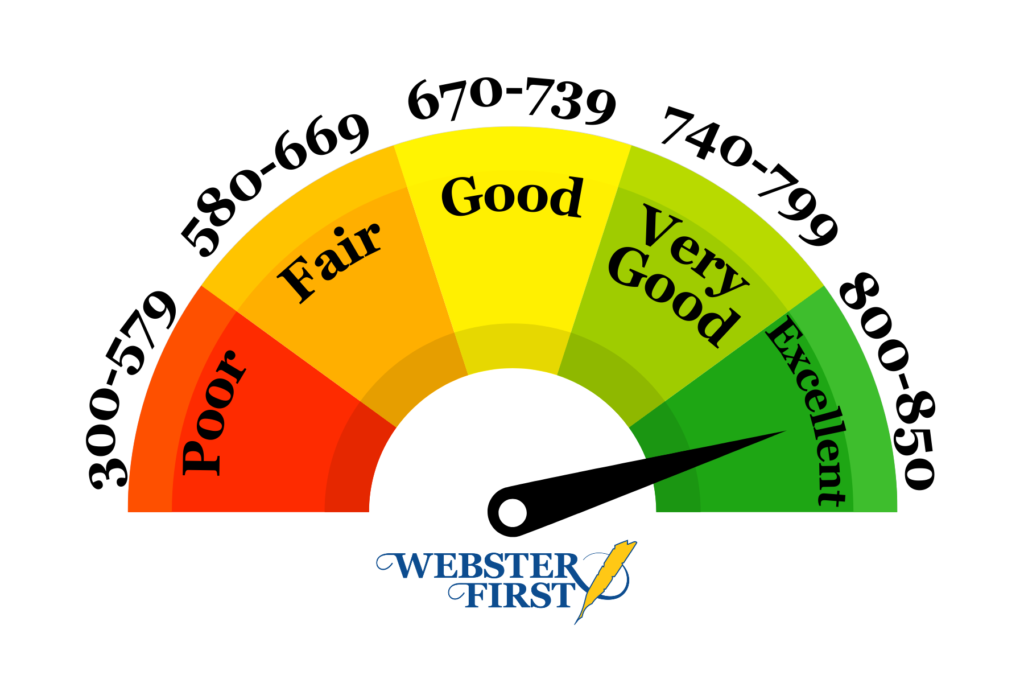What is a good credit score? How to build and raise your score
Updated March 25, 2024 | Published January 10, 2023
-
Categories:
- Debt & Your Credit

Have you checked your credit score lately? Do you know what a good credit score is? Having a good credit score is important when you want to make big life decisions like take out a loan or get approved for a lease.
When taking out a loan, your credit will not only affect your approval odds, but will also affect the interest rate you receive. Generally, better credit equals a lower interest rate because banks or credit unions will look at your history and see you as trustworthy. Lower credit generally equals a higher interest rate, because they will see you as a risk. This will cost you more money in the long run.
What is my credit score?
Credit scores can range from poor to excellent. There are three credit bureaus that lenders report to: TransUnion®, Equifax®, and Experian®. If you don’t know your score, there are several ways you can find out, but your score will vary depending on where you check. Different companies use different scoring models such as FICO® or VantageScore®. To find out where you can get free scores and alerts to changes in your credit report, go to vantagescore.com or ficoscore.com.
What’s a good credit score?
Once you know your score, you can see where you land. Again, this can vary depending on the scoring model used, but generally falls along these lines:
- 300 – 579: Poor credit score
- 580 – 669: Fair credit score
- 670 – 739: Good credit score
- 740 – 799: Very good credit score
- 800 – 850: Excellent credit score

Source: Equifax
What can I do to bring my score up?
Make on-time payments
Whether you are just starting out and need to build credit, or you had some missteps that you need to correct, making on-time payments is the best way to heighten your score. Setting up automatic payments can help ensure that you’re paying at the same time every month. With Webster First’s online banking, you can use our bill pay tool to set up automatic payments to an external account. Alternatively, use our payment portal to set up recurring payments for internal accounts such as a Webster First personal loan or car loan.
Pay a card balance down to $0
Another way to improve your credit score is to pay a credit card balance down to $0, but don’t close it. Closing lines of credit can often hurt your score, especially if they are your longest open lines. Credit bureaus want to see that you have a long history of on-time payments. Paying off a card and having it removed from your credit report effectively makes your credit history shrink. You can use Webster First’s “Debts” tool in online banking to forecast debt payoffs and compare strategies that will help you pay down card or loan balances.
Don’t use more than 30% of your limit
You may have been approved for a credit card with a limit of $10,000, but don’t spend it all in one place. Credit bureaus do not like to see maxed out cards. People who have the highest credit scores typically keep their spending under 30%. For example: if you have a $10,000 credit card limit, you’ll want to keep your credit utilization under $3,000.
Open up a credit builder loan
Webster First offers a credit builder loan that helps to build your credit and savings at the same time. Here’s how it works: you get a loan from $500 to $5,000 available in a variety of terms, but instead of having access to that money to spend, Webster First will invest it into a certificate for you*. Each month that you make a payment, your money goes towards buying back that certificate. Credit bureaus will see your on-time payments and your score will increase.
Certificates earn dividends, so by the time you pay back your loan, not only will your credit score have improved, but you will have earned your loan amount plus extra. Use this to help build your savings! Whether you are saving or trying to pay off some debt, a credit builder loan is an easy way to add to your savings account.
*Proceeds will be put into a certificate for the same term as the loan. The full original amount of the loan will be held until the loan is paid off. No withdrawals can be made from the certificates (even with penalty) unless the loan is paid in full.
Equifax® is a registered trademark of Equifax Inc. © 2023, Equifax Inc., Atlanta, Georgia. All rights reserved. All other trademarks or registered trademarks are the property of their respective owners.
© Copyright 2023 TransUnion LLC. All Rights Reserved.
© 2023 Experian. All rights reserved. Experian and the Experian trademarks used herein are trademarks or registered trademarks of Experian and its affiliates. The use of any other trade name, copyright, or trademark is for identification and reference purposes only and does not imply any association with the copyright or trademark holder of their product or brand. Other product and company names mentioned herein are the property of their respective owners.
© 2023 VantageScore Solutions, LLC. All Rights Reserved.
© FICO 2023. All Rights Reserved.